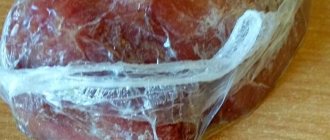Salt is used in cooking to improve the taste of foods. This component is especially important for vegetable dishes, because they contain large amounts of vitamins and mineral salts. In addition, salt works as a preservative. Thanks to this additive, food becomes tastier and more appetizing. But it is important not to overdo it.
If the dish turns out to be too salty, it is recommended to reduce the salt concentration, as this is not only not tasty, but also harmful to health. Consuming large amounts of salt leads to swelling and increases blood pressure. Salt disrupts the water-salt balance, which can cause atherosclerosis and stroke.
Pea or borscht - a lot depends on the soup
You need to choose a method for saving soup in accordance with common sense and the recipe, depending on what kind of soup you are cooking.
- The easiest way to add noodle soup is to add pasta or finely grate fresh potatoes.
- Add a little lemon juice or unsweetened tomato paste to the cabbage soup and borscht.
- You should beat an egg into chicken, pea, bean, mushroom soups, and especially into green cabbage soup.
- Adding sour cream when serving will be optimal for cabbage soup, mushroom soup, solyanka, and borscht.
- Cream is best suited for pureed soups.
- Tomato soups, solyankas, pickles or fresh cold summer soups such as Spanish gazpacho should be acidified with lemon juice or vinegar.
How to quickly save a dish if you have over-salted the soup: dilute the broth!
- Add a little boiled (!) water, but no more than 1/3 of the total volume.
- To maintain the richness of a meat dish, it is better to use ready-made unsalted broth. Some experienced housewives even store it in the freezer, using a regular ice tray or other convenient container to always have on hand.
- Simmer over low heat after boiling for 2-3 minutes, then remove from heat.
Important: This method is not suitable for soups with smoked meats or borscht, because In the finished dish, richness of taste, richness and thickness are important. And if you add additional main ingredients, they will cook unevenly, since some of them will already be ready.
As an alternative, or if you have over-salted the soup, you can cook a small portion of the same soup without using salt. And then combine both dishes together. To ensure that the saltiness is evenly distributed, boil the stew for about 2 minutes.
Potato
Potatoes can replace rice cereal. It will absorb some of the seasoning. The chopped vegetable can be added to the soup at any time during cooking. If it is not in the recipe, then dip a few peeled potatoes into the broth and remove them at the end of cooking. It should be remembered that the taste of the vegetable will still remain in the dish. This method will not work for all soups.
Water
The easiest way to remove excess salt from soup is to add boiled water and cook for another 5 minutes. The liquid will dilute the prepared broth, softening the taste. Add it gradually, tasting the dish all the time. The disadvantage of this method is that soup that is not thick enough can lose its richness and become too bland. It is better to add broth cooked without salt.
Reasons why oversalting may occur
- Using fine salt. Fine salt is much saltier than coarse salt, so add it carefully, in small portions.
- The salt shaker broke and a lot of salt spilled out. To prevent this unpleasant situation, check the integrity of the salt shaker over the sink before salting the dish.
- Distracted. Oh, there are so many things that can distract a housewife while preparing dinner: the phone rang, a child came up with another question or request, interesting news was shown on TV, and much more. With all this, it’s easy to forget whether the soup has already been salted and add salt again.
- Little experience. It is difficult for young housewives to determine how much salt is required for a given volume of borscht. There is only one way out - salt a little and taste.
What to do if you over-salt your soup: tips
- Add sour cream or cream when serving, this will neutralize the slight saltiness of the soup.
- Fry croutons (preferably rye bread), without salt. For pea soup, garlic croutons are an excellent option - just fry 3-4 cloves of garlic with croutons, passing them through a press.
- If you over-salted a light vegetable soup, then make dumplings or dumplings! To do this, beat 2 eggs with 3 tbsp. l. milk (possibly with water) and knead a not very tight dough. Don't use salt! Drop the dumplings into the water with a spoon and cook for about 3 minutes.
And to understand what the difference is between them, we suggest reading the article “What is the difference between dumplings and dumplings?”
- work on the same principle , but make them without salt.
- If the soup is thin, add boiled beans. Then simmer together for about 4 minutes.
Important: When cooking beans, do not use salt, otherwise the cooking time will increase significantly. The spice is added at the very end, but we don’t need it.
- When serving, you can put half or a quarter of a boiled egg on a plate, sprinkling chopped herbs on top. This option is suitable for soups that are not too salty.
- The slight saltiness will also be removed by butter if you put a small piece of it directly on the plate.
As you can see, even over-salted soup can be saved! But never forget that you need to salt and season dishes when you already have all the ingredients. And remember the golden rule - “it’s better to under-salt on the table than over-salt on the back”! And everyone can add salt themselves, adjusting it to their taste.
How to correctly calculate the amount of salt when cooking
It is better to salt the dish correctly right away than to correct it if it is over-salted. To do this, you need to correctly calculate the amount of salt for broths. As a rule, one teaspoon of salt is used per liter of broth. But each person has different sensitivity to taste buds. That's why one always adds too much salt, the other always cooks the soup bland.
You need to salt the soup in small portions of salt, tasting it each time. There is no need to be distracted from this process, otherwise you may add salt to the soup twice.
You should not try the soup immediately after salting. It should boil a little and the salt should dissolve well. After the broth has boiled, you need to take a sample and add salt if necessary.
It is best to stir the soup well before tasting it. The fat that accumulates on top practically does not absorb salt. Therefore, taking the broth from above is not entirely correct.
It must be remembered that cooled soup will be saltier than hot soup. Therefore, there is no need to be too zealous with salt during cooking. It’s better to under-salt it a little than to urgently correct the over-salting later.
For your information! If, after all, the soup could not be saved, its ingredients can be saved. Over-salted meat or fish together with vegetables can be used as a pie filling, diluting them with fresh ingredients.
Precautionary measures
There are a number of measures to prevent excessive salting of soups that you need to remember during cooking:
- Salting the soup is the last stage of cooking. Salt should be added before turning off the stove, in small portions, when all the ingredients are cooked, taking a sample each time. When cooking the first course, it is necessary to take into account the amount of salt contained in the products from which the soup is prepared. Pickled cucumbers, sauces, sorrel, smoked meat already contain salt, so less of it will be needed.
- Changing the brand and manufacturer of salt, its grinding, its purpose (for pickling or table salt) can affect its level in the dish. It may be less or more salty. Therefore, you need to be careful when using a new product.
As a result, it turns out that over-salted soup is not a death sentence for its disposal. There are many ways to save and revive the first dish, and at the same time make it tastier, more satisfying, and healthier. You can even get a completely new recipe for your usual soup or broth. Therefore, you should not fall into despair when over-salted soup ends up on the table. You need to be smart, and everyone will remain full and happy.
Products that will remove salt from broth
Some products that we always have on hand can reduce the level of salt in soup and improve its taste:
- rice;
- potato;
- black bread;
- a raw egg;
- sugar.
They can be used for different types of soups.
Rice
One of the most common adsorbent products that can absorb excess salt is raw rice. You can simply add a small amount of it to over-salted vegetable, mushroom or fish soup. Just remember that the rice takes about 10 minutes to cook. Add it during the cooking process, or you will have to deal with overcooked grains .
Rice absorbs excess salt well when cooked.
Rice in the soup goes well with millet and pearl barley.
For soup with noodles, borscht or cabbage soup, adding rice is not applicable. And what to do in such a situation? Yes, very simple. Cooking rice in a bag will help you. Just put it in a pot of soup for 5-10 minutes and the grains will absorb the excess salt.
Just add a bag of rice to the soup and you can forget about salting
In addition to rice, you can use other grains, such as wheat.
If you don’t have cereal in bags, and you don’t have time to run to the store, proceed as follows. Wrap a handful of rice in gauze or cotton cloth and tie it with string to make a bag . Place it in the soup and cook, tasting the broth for salt from time to time. As soon as you feel that the taste has returned to normal, take out the bag.
Note! This universal method is good because it is suitable for any soup, borscht and cabbage soup, including green ones.
Video: what to do if you accidentally over-salted your soup
Potato
Potatoes cut into strips or cubes not only absorb excess salt, but will also become an additional ingredient in your soup, borscht or cabbage soup. However, if the dish does not include potatoes, or the soup is almost finished cooking, this method will not work. Let's do things a little differently. Peel 2-3 tubers and add them to the broth whole or cut in half . After 10 minutes, you can take out these extra potatoes and pour the soup into bowls.
Add a few whole or cut peeled potatoes to the over-salted soup to get rid of excess salt in the broth
Brown bread or flour
You can also use rye bread, ideally stale or dry. Wrap it in a fairly thick cotton cloth and dip it in the broth for 5 minutes, then remove it.
Do not use gauze: the bread runs the risk of getting soggy and “spreading” throughout the soup, although the quality of the dish will not suffer from this. On the contrary, the broth will become a little thicker and richer.
A small piece of bread will help you correct the taste of the dish by absorbing excess salt
If you don’t have black bread, use regular flour, make a tight fabric bag for it and put it in a saucepan with soup for 10 minutes. Flour also perfectly absorbs excess salt. The worst thing that can happen is that the broth becomes cloudy and loses its transparency . But the taste of the soup or borscht will not suffer at all.
Flour will not only reduce the saltiness of soup or borscht, but also add thickness to the dish
Cloudy soup can be corrected by adding a raw egg or minced meatballs.
A raw egg
The soup is too salty and almost cooked, but the family is already waiting for lunch? There is absolutely no time left to correct the problem... And yet there is a way out here too. Take a raw egg, separate the white and pour it into the boiling soup. Mix well. When the protein has curdled, remove the flakes from the broth using a spoon.
Pour an egg white or a whole egg into over-salted soup to get rid of the overly salty taste.
However, you can mix the white and yolk into a homogeneous mass (but do not beat!), and carefully pour into the boiling soup. The egg will absorb excess salt. And it is not necessary to remove it from the soup .
This is an ideal way for summer soups without meat and green cabbage soup.
Video: how to fix over-salted soup with an egg
Rafinated sugar
If there is a lot of salt in the soup, you can use a well-known counterweapon against it - sugar. True, this method will require you to be careful. Place a piece of refined sugar in a ladle and lower it into the boiling soup . Hold until the piece becomes loose, take out the ladle and taste the broth. If there is still a lot of salt, repeat the process with a new piece of refined sugar. Taste the soup as often as possible so as not to miss the moment when the flavors balance out. If you also “overdo it” with sugar, the soup will be hopelessly spoiled.
Sugar can neutralize the taste of salt, but you need to use it carefully
If the oversalting is very slight and the taste of the soup allows for salty-sweet combinations, as is typical, for example, in cream soups or other dishes of European, in particular Polish, cuisine, then simply sweeten the broth a little with honey.











